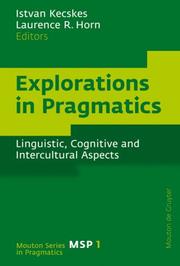| Listing 1 - 2 of 2 |
Sort by
|

ISBN: 9783110193664 3110193663 Year: 2007 Volume: 1 Publisher: Berlin Mouton de Gruyter
Abstract | Keywords | Export | Availability | Bookmark
 Loading...
Loading...Choose an application
- Reference Manager
- EndNote
- RefWorks (Direct export to RefWorks)
The papers in this volume reflect current trends in international research in pragmatics over recent years. The unique feature of the book is that the authors coming from ten different countries represent all aspects of pragmatics and address issues that have emerged as the result of recent research in pragmatics proper and neighboring fields such as cognitive psychology, philosophy, and communication. Recent theoretical work on the semantics/pragmatics interface, empirical work within cognitive and developmental psychology, intercultural communication and bilingual pragmatics have directed attention to issues that warrant reexamination and revision of some of the central tenets and claims of the field of pragmatics. In addition, cultural changes originating from globalization have affected the relation of language to the wider world. In particular, the spread of English as a global language has led to the emergence of issues of usage, power, and control that must be dealt with in a comprehensive pragmatics of language. Pragmatic theories have traditionally emphasized the importance of intention, rationality, cooperation, common ground, mutual knowledge, relevance, and commitment in the formation and execution of communicative acts. The new approaches to pragmatic research reflected in this volume, while not questioning the central role of these factors, extend the purview of the discipline to allow for a more comprehensive picture of their functioning and interrelationship within the dynamics of communication. The papers address these issues from a variety of directions. In Part I, Searle and Horn examine language use and pragmatics from a philosophical perspective. In Part II, the cognitive aspect of pragmatics is represented in the papers of Moeschler, Ruiz de Mendoza & Baicchi, and Giora. They focus on well-known domains such as illocutionary constructions, the pragmatics of negation, and the relevance-theoretic concept of explicature. However, each paper sheds new light on the familiar concepts. The papers in Part III by Mey, Kecskes and Grundy discuss the intercultural aspects of pragmatics while Terkourafi explores the explanatory potential of an interpretation of Grice's Cooperative Principle. Margerie's and Geeraert & Kristiansen's articles focus on the application of usage-based methodology in different ways within pragmatics.
Pragmatics
---
Pragmatics.
---
Pragmalinguistics
---
General semantics
---
Language and languages
---
Logic, Symbolic and mathematical
---
Semantics (Philosophy)
---
Philosophy
---
Semiotics
---
Cognition
---
Pragmatik.
---
Landau

ISBN: 1282194585 9786612194580 3110198843 9783110198843 3110193663 9783110193664 9781282194588 6612194588 Year: 2007 Publisher: Berlin ; New York : Mouton de Gruyter,
Abstract | Keywords | Export | Availability | Bookmark
 Loading...
Loading...Choose an application
- Reference Manager
- EndNote
- RefWorks (Direct export to RefWorks)
The papers in this volume reflect current trends in international research in pragmatics over recent years. The unique feature of the book is that the authors coming from ten different countries represent all aspects of pragmatics and address issues that have emerged as the result of recent research in pragmatics proper and neighboring fields such as cognitive psychology, philosophy, and communication. Recent theoretical work on the semantics/pragmatics interface, empirical work within cognitive and developmental psychology, intercultural communication and bilingual pragmatics have directed attention to issues that warrant reexamination and revision of some of the central tenets and claims of the field of pragmatics. In addition, cultural changes originating from globalization have affected the relation of language to the wider world. In particular, the spread of English as a global language has led to the emergence of issues of usage, power, and control that must be dealt with in a comprehensive pragmatics of language. Pragmatic theories have traditionally emphasized the importance of intention, rationality, cooperation, common ground, mutual knowledge, relevance, and commitment in the formation and execution of communicative acts. The new approaches to pragmatic research reflected in this volume, while not questioning the central role of these factors, extend the purview of the discipline to allow for a more comprehensive picture of their functioning and interrelationship within the dynamics of communication. The papers address these issues from a variety of directions. In Part I, Searle and Horn examine language use and pragmatics from a philosophical perspective. In Part II, the cognitive aspect of pragmatics is represented in the papers of Moeschler, Ruiz de Mendoza & Baicchi, and Giora. They focus on well-known domains such as illocutionary constructions, the pragmatics of negation, and the relevance-theoretic concept of explicature. However, each paper sheds new light on the familiar concepts. The papers in Part III by Mey, Kecskes and Grundy discuss the intercultural aspects of pragmatics while Terkourafi explores the explanatory potential of an interpretation of Grice's Cooperative Principle. Margerie's and Geeraert & Kristiansen's articles focus on the application of usage-based methodology in different ways within pragmatics.
Pragmatics. --- Semiotics. --- Semeiotics --- Semiology (Linguistics) --- Semantics --- Signs and symbols --- Structuralism (Literary analysis) --- Pragmalinguistics --- General semantics --- Language and languages --- Logic, Symbolic and mathematical --- Semantics (Philosophy) --- Philosophy --- Pragmatics, Cognitive Linguistics.
| Listing 1 - 2 of 2 |
Sort by
|

 Search
Search Feedback
Feedback About
About Help
Help News
News